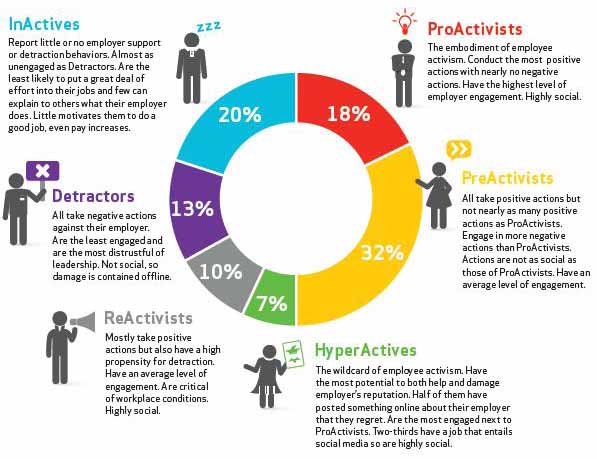It has always been said that employees are a company’s biggest asset, and these days their power to help build businesses is even stronger.
Leslie Gaines-Ross, chief reputation strategist at PR firm Weber Shandwick, describes a trend that the firm discovered several years ago: “We noticed more employees defending their employers online in the comments sections of news articles, and even learned of one company whose employees asked what they could do to help after the company found itself in the negative spotlight. Our idea to investigate employee activism was born.”
Gaines-Ross describes exactly what is meant by “employee activist”: “Employee activists make their engagement visible, defend their employers from criticism and act as advocates, online and off. As we see it, employee activism is the evolution of employee engagement and will increasingly become crucial to company success in this digital era.”
Looking at European workforces in particular, Gaines Ross outlines highlights of the research:
1.) There is pervasive unrest in the workforce, with 84 per cent of European employees having recently experienced some kind of employer change in the past few years and only 28 per cent being deeply engaged at work. Employers are not communicating effectively, with only 46 per cent of European employees confidently able to describe what their employers do.
2.) Employees talk about their employers online, regardless of whether companies are aware or even encouraging them to do so. Of the European employees in the study, 43 per cent post messages, pictures or videos in social media about their employer. Employees are using their social power to define their employers’ brands and reputations on their own.
3.) The employee activist is now amongst us. Using segmentation modelling, employee respondents were sorted by their reported actions, both positive and negative, towards their employers. The model identified six distinct segments of employees. In Europe, 18 per cent of employees are classified as activists or what are dubbed “ProActivists“. ProActivists take positive actions for their employers and are an organisation’s brand and reputation champions. They are the “all-star” employees that every leader wants on his or her team.

4.) Social media encouragement from employers has an outsized impact on advocacy among employees. Some companies are already connecting the dots: 24 per cent of European employers encourage employees to use social media to share news and information about work. Social media may enhance risk, but it also enhances business opportunities and strengthens engagement. European employees whose companies encourage social sharing are 51 per cent more likely to recommend their company’s products or services, a true ROI metric if an employer is looking for proof.

Gaines-Ross says that the study offers suggestions for activating employees, including strategies for accelerating the activism of an organisation’s biggest supporters and defusing the negative actions of detractors.
Gaines-Ross concludes: “In an always-on and super-enabled environment, employers will increasingly need a band of employees who can take action by spreading the right messages, helping recruit the best talent or defending their position when they are under scrutiny. Employees will continue to rise to new heights of influence and are quickly becoming one of an organisation’s strongest assets.”
Methodology
Weber Shandwick, in partnership with KRC Research, conducted Employees Rising: Seizing the Opportunity in Employee Activism, an online survey of 2,300 employees in 15 markets. The research explored the employee activist movement to help organisations understand what it takes to catch the rising tide of employee activism.
PR Masterclass: The Intersection of PR and GEO
Join PRmoment for a Masterclass featuring 10 of the industry’s foremost experts. You will walk away with a clear, actionable strategy for adapting your content to an AI-first search environment.
Taking place on Wednesday 25th February in London, both virtual and in person tickets are available.
Early bird ticket sale ends Friday 9 January.
PR MasterclassIf you enjoyed this article, sign up for free to our twice weekly editorial alert.
We have six email alerts in total - covering ESG, internal comms, PR jobs and events. Enter your email address below to find out more:









